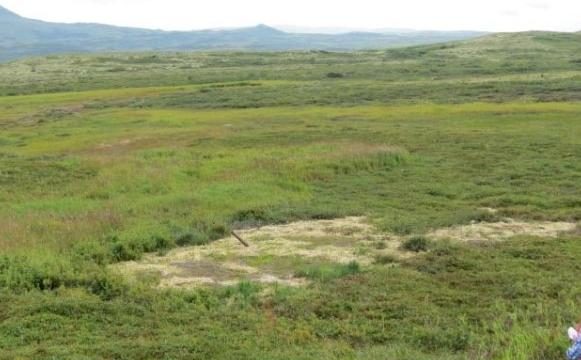
Alaska’s Department of Natural Resources has delayed renewing a two-year land use permit for the Pebble Limited Partnership to give state regulators more time to review an “extensive” number of public comments.
The state-issued miscellaneous land use permit (MLUP) will allow Pebble to continue exploration activities at its claims northwest of Iliamna. The company acknowledged little is planned for the upcoming field season, and little has occurred there since losing the financial backing of partner Anglo American in 2013. Pebble said it is operating the claims under ‘care and maintenance’ status, but still needs to the land use permit to do so.
While it’s considered a routine renewal of a permit that does not allow for any large scale mining, Pebble is a uniquely controversial project, and critics took a public comment period to raise “substantive” issues.
“Normally we don’t have the number of comments come in for a permit application that came in for this one,” Marty Lentz said. Lentz is the Mining Section Chief within DNR’s Division of Mining, Land and Water. “The time frame of those comments, and the importance of the project, require us to give substantial time to review and thoroughly examine the comments and consider how important they are to implement any opportunities within the permit for those suggestions.”
DNR sent a letter to Pebble explaining the extension of the current permit in order to delay action on the full two-year renewal request. The letter said the Department “received many substantive comments on some complex issues,” and the delay will allow staff to “comprehensively consider the breadth and scope of the complex issues raised” during the public process.
Lentz said his office is still logging all of the input, and offered no comment on any specific concerns raised.
Many public comments were sent in regarding a report commissioned by the United Tribes of Bristol Bay and conducted by geophysicist Dave Chambers. Last summer Chambers traveled around the Pebble claims to survey a portion of the exploratory well sites; his report was critical of drill cuttings left exposed on the tundra, well casings left sticking above the surface and some drill holes that were allowing water to flow out. Chambers believe some of those issues, specifically the drill cuttings, have not been as concerning to state and federal regulators as they should be.
“I’ve reviewed the report by Mr. Chambers, and there will be opportunities in the upcoming field season during our inspection to answer the accuracy of the statements in that report,” Lentz said.
The public comment period on the permit renewal was open for 30 days in November. Lentz said that is also unique, tied to a lawsuit brought by Nunamta Aulukestai against DNR.
“The Nunamta court case required a 30 day comment period on permit applications period [be given] to the plaintiffs in that court case,” Lentz said. “Our standard practice for these permits has been a courtesy public notice for 14 days, but we’ve granted that [30 day] comment period to the public as well as the plaintiffs in that court case.”
DNR extended Pebble’s current miscellaneous land use permit for three months while it reviews the public comments. Pebble is still seeking the full two year renewal for 2017-2018 activities.
PLP said it maintains a “clean and compliant” mineral exploration site, something the state regulators at DNR tend to agree with. They inspect the site every year, and in their most recent report from the 2016 season, said “overall, the Pebble Limited Partnership operation is in good condition and is consistent with industry standards.”




